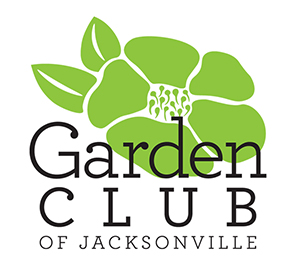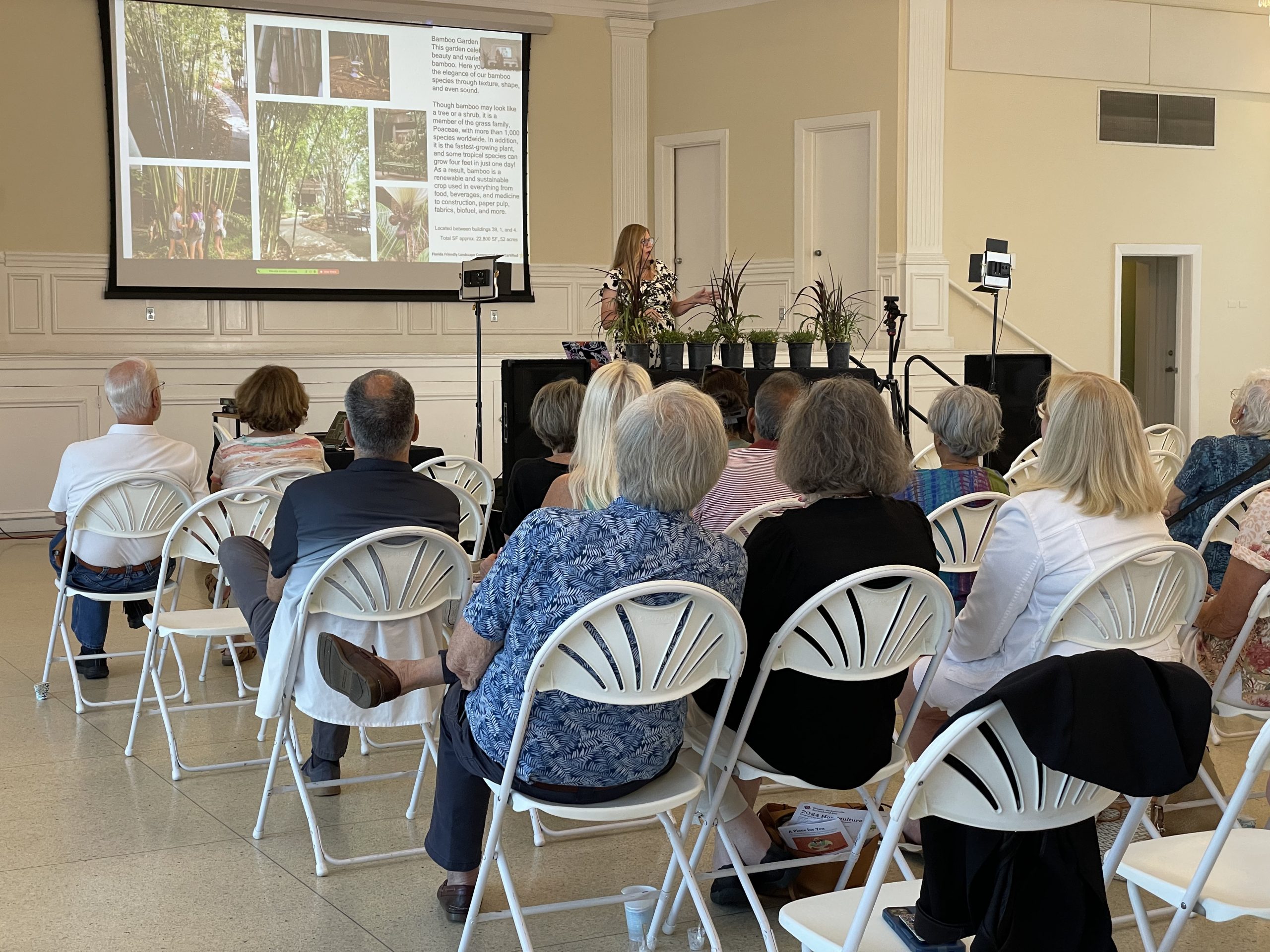Did you know that the University of North Florida Botanical Gardens cover the entire campus? On June 4, UNF horticulturalist Rhonda Gracie guided guests through a virtual tour of all the beautiful gardens throughout the UNF campus. Each garden is a stunning, thoughtful work built with purpose in mind whether that be a message on climate change, supporting native fauns, or educating guests on edible plants. In 2022 the UNF Botanical Gardens received five gold-level Florida Yards and Neighborhoods commercial certifications from the University of Florida Institute of Food and Agricultural Sciences.
Guests also enjoyed candied hibiscus roselles and various floral teas made from blooms sourced from UNF’s gardens.
The UNF Botanical Gardens encompass sixteen total gardens. Check out descriptions of eleven named gardens below:
Bamboo Garden
Did you know that bamboo is actually a member of the grass family, rather than a true tree, and that bamboo has more than 1,000 species across the globe? Bamboo has made a comfortable home in Florida, and its beauty is cultivated on the UNF campus’ Bamboo Garden. Bamboo is a renewable and sustainable crop that is used in many industries, such as food and beverage, medicine, construction, homewares, paper, fabrics, biofuel, and more.
Bamboo helps to reverse climate change and global warming by absorbing harmful greenhouse gases.
Bioswale Garden
Do you know what a bioswale is? A bioswale is a linear, vegetated ditch that allows for the collection, conveyance, filtration, and infiltration of stormwater. A bioswale also provides habitats for native fauna.
The UNF Bioswale Garden was designed to resolve localized flooding issues and to slow and clean stormwater runoff from the road. Native plants and gravel act as filters and remove pollutants from stormwater, so the water is cleaned before it reaches nearby waterways and aquifers through an attractive garden scape.
Butterfly Garden
Butterflies are one of the oldest animal species on earth, having been around for 50 million years! They live on every continent except Antarctica though they are at risk as climate change affects their populations and native habitats.
With that in mind, the UNF Butterfly Garden was established with colorful, vibrant flowers and plants that attract and support butterflies through all of their life stages.
Climate Change Demonstration Garden
Already a warm state, Florida is particularly sensitive to climate change. While its current plant hardiness zone is 9a, as temperatures rise, that is likely to change. The Climate Change Demonstration Garden was grown to represent how the impacts of climate change might alter our traditional local landscaping. Some of the flora in this site are from warmer zones with a 10-degree difference or higher.
This site provides a localized micro-climate through a combination of architecture like concrete sidewalks and south-facing brick walls, which absorb heat from the sun throughout the day. Then heat is slowly released during the night when temperatures drop.
Though some of the plants are from warmer zones, these plantings do not receive any additional protections during the winter, most surviving year to year apart from extreme cold events. The coexistence of plants from various zones shows how adaptable our local plants are, the changes made by our warming climate and what landscaping options work.
Cycad Garden
Cycads are one of the oldest plant species on Earth, at 300 million years old. Wow! Cycads have a long history of use for food and medicine. While some parts of the plants can be edible when the cycad’s poison is removed through cooking, always wear nonabsorbent gloves when handling cycads to avoid accidental poisoning that can have serious results. Unfortunately, today, they are the most threatened plant group in the world. Botanical gardens serve as a safeguard against extinction and a resource for research and education.
Cycads look like palm trees, but they are unrelated. Cycads are gymnosperms – “naked-seed” plants – that do not make flowers or fruit. Instead, they bear separate female cones that make seeds and male cones that make pollen.
Frederick and Ophelia Tate Ogier Gardens
The Frederick and Ophelia Tate Ogier Gardens is the epicenter of innovative environmental and public health programming. Located on one acre, on the north end of campus, these organic gardens feature row crops, a wide variety of fruit trees, raised vegetable beds, and peaceful sitting areas for students to relax.
The mission of the UNF Ogier Gardens is to create a healthier UNF community through nature contact while growing crops and social connections, demonstrating sustainability and biodiversity, as well as nourishing people with local, fresh, and delicious food. Most of the produce grown in the Ogier Gardens is distributed through our on-campus food pantry, the Lend-A-Wing. This addresses student food insecurity by providing fresh produce. Produce is also used for cooking workshops and demonstrations to strengthen our student’s healthy life skills.
The Ogier Gardens’ programs educate about nutrition, as well as the linkages between environmental, mental, and public health. Through the “Healthy Osprey Initiative,” Recreation and Wellness champions a healthy lifestyle and improves student retention.
Healing Garden
Built around relaxation, the Therapeutic Nature of the Garden will help you restore yourself through nature by interacting with calming plants. You can move freely through the gardens as you learn about the healing powers of various medicinal plants. Or you can choose to rest on a rock or cradle hammock under a ceiling of green and blue and immerse yourself within the urban forest.
In the Rose Parterre, experience planted geometry, smell a rose and meditate while walking the labyrinth. The artful arrangement of plants and fragrances delights the senses within a controlled setting.
Experience nature at work within the informal Bee Patch. Observe birds and an array of pollinators foraging for nectar and pollen from flowers of different shapes and colors.
Native Garden
This garden showcases Florida’s rich diversity of indigenous trees, shrubs, grasses and wildflowers with the wildlife they support. The plants display their natural habitat relationships and include a beach dune, dry prairie, coastal upland and wetland areas. Understanding plant associations helps us to select the right plant for the right place and group them based on similar needs to help them thrive.
Native plants save water and require no pesticides or fertilizer because they have adapted to our climate and soils over thousands of years, unlike many nonnative plants. They also support wildlife with food and shelter, which is critical as recent studies have documented an alarming decline in insect populations worldwide due to habitat loss from urbanization. By selecting Florida-friendly native plants to urban landscapes, and even your yard, you can help reverse this decline.
Peace Plaza Garden
The idea of creating a peace garden was conceived in 2006 when the Gandhi Memorial Society gifted the 8-foot-tall Mahatma Gandhi sculpture to the University. In 2012, UNF became the first campus in Florida to unveil a bronze statue of Martin Luther King Jr., which stands at 8-foot-6-inches tall on the opposite end of Peace Plaza facing Gandhi. Both sculptures were created by artist Jasu Shilpi.
Both peacekeepers quoted Henry David Thoreau and his essay on Civil Disobedience. To highlight his influence, a solid black granite monument – Thoreau’s Table – was placed in the garden to feature some of these quotes. The rest of the plaza landscape provides a quiet space for contemplation, meditation or study.
The plaza’s eye-pleasing, low maintenance, and water-wise garden flora feature several plants symbolic of peace in many cultures, such as an olive tree, Nelson Mandela Gold bird-of-paradise, bleeding heart, peace lily, sedums and rosemary.
Potager Permaculture Guild Garden
What is a potager garden? Potager is a French word meaning a kitchen garden that includes vegetable plots that are both pretty and productive. Since potager gardens have flowers and decorative elements, adding permaculture land management principles is economical over traditional farming practices.
Permaculture uses 12 ecological practices, such as intermixing companion plantings for increased biodiversity, with huge benefits that include attracting good bugs, repelling harmful bugs, increasing yields and conserving energy. For example, lemongrass intermixed with bananas is a natural deterrent for pests and weeds. Roselle Hibiscus flowers provide pollination with edible rose hips. You can even candy them into a sweet treat! Sweet potato and spinach double as produce and form a living groundcover that prevents weeds while retaining soil moisture. Beans use banana stalks for support as they grow and are excellent nitrogen fixers.
If you find yourself needing a snack in the Potager Garden, you are encouraged to enjoy seasonal crops such as the “ice cream” bananas. Yum!
Roy Lassiter, Arthur Bloomer and Jack Funkhouser Leaders and Legends Garden
The garden was founded in 2022 to honor Founding Faculty members Roy Lassiter, Arthur Bloomer and Jack Funkhouser. This modern outdoor remembrance celebrates their enduring friendship, love of the fine arts, music and contributions to the University of North Florida.
The boxwoods and native dwarf yaupon holly shrubs are pruned into topiary balls and arranged to symbolize music dots and notes. White coquina stone mulch represents sheet paper. Evenly spaced zelkova tree trunks suggest measures of music, and large granite spheres echo the topiary shape and provide a whimsical structural element. The spheres and large planters adorning the half columns are available to dedicate to a loved one.
The movement of wind produces resonance and reverberations as it rustles leaves and engages the wind harp. Musical sounds from plants, nature and instruments are therapeutic and a harmonious way to honor this legendary trio’s leadership that helped to guide the University’s School of Music into a premier program.
Rhonda Gracie
Rhonda Gracie graduated from Florida International University with a bachelor’s degree in architectural studies. She also has a degree in parks and recreation maintenance management from North Carolina State University. She is the former landscape architect for the cities of Clearwater and Miami Beach, where she has won many awards for notable projects and sustainability efforts. Since 2013, she has been the horticulturist at the University of North Florida, where she and her department are responsible for the management of more than 1,600 acres. She serves on many professional boards and committees and has focused on transforming the campus into a Botanical Garden. Gracie has helped with the implementation of 10 Florida-friendly gold-level certified gardens, UNF’s Bee Campus USA designation, and 26 transformational educational garden exhibits. She has won 12 awards and certifications, including UNF Duval County School Employer Partner of the Year and the 2022 recipient of the Florida Nursery, Growers, and Landscape Association (FNGLA) Outstanding Educator of the Year Award.












